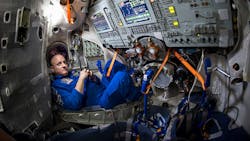Relief for NASA after Russian Cargo Ship Docks at ISS
MOSCOW — An unmanned Russian cargo ship successfully docked with the International Space Station on Sunday following a string of failed attempts to resupply the orbital laboratory.
“The transport cargo ship, Progress M-28M, has docked with the ... Russian segment of the ISS at 10:11 a.m. Moscow time,” Roscosmos, the Russian federal space agency, said in a statement.
The ship is carrying more than 5,070 pounds of oxygen, fuel, food and scientific equipment, as well as personal packages for the international crew of three.
Russian cosmonauts Gennady Padalka and Mikhail Kornienko, and U.S. astronaut Scott Kelly are part of Expedition 44 currently in space, to be joined by three more people later this month. Commander Padalka is scheduled to return to Earth in November, while Kornienko and Kelly are part of a year-long mission and will not go home until next March.
The Russian crew members oversaw the automatic docking of the Progress, which arrived after circling Earth 34 times following its launch from the Baikonur cosmodrome in Kazakhstan on July 3.
“Congratulations guys, your cargo ship has arrived,” Padalka could be heard telling ground control after contact was complete with the ship, which came in “perfect shape” according to NASA.
The Progress will remain docked to the ISS for four months, getting filled with trash and discarded gear before it journeys back to Earth, burning up on reentry over the Pacific Ocean.
'Third time is the charm, as they say'
Completion of Sunday’s mission was met with relief because it ended a streak of botched deliveries this year. “Crew reports, ‘Feels like Christmas in July,’“ the official ISS Twitter account posted after the docking.
“Third time is the charm, as they say,” Kelly chuckled on his Twitter blog, referring to the series of accidents in recent months.
The Progress’ arrival comes just one week after the explosion of a U.S. Falcon 9 rocket launched by SpaceX, which was supposed to deliver expensive gear in the unmanned Dragon capsule.
Among the lost equipment was a docking adaptor — the first of its kind — that would allow commercial crew vehicles to dock with the station in the future.
A previous launch of a Progress vessel in April also ended badly, as Russian flight control lost communication with the ship and could do nothing but watch it slowly descend and burn up in the atmosphere.
The problem was a glitch on the carrier Proton-M rocket, similar to an incident last year when the same model of rocket fell to Earth carrying Russia’s most advanced communications satellite.
The recent Proton failures are a major embarrassment and have been one of the reasons the government has launched sweeping reforms in the sector, which will reshape Roscosmos into a state corporation.
Last year also marked the loss of the U.S. Cygnus cargo carrier, whose Antares rocket exploded shortly after liftoff in October.
NASA had said the ISS was well-stocked until October even before the Progress arrived, but the industry has still been reeling after three accidents in a row.
Copyright Agence France-Presse, 2015
About the Author
Agence France-Presse
Copyright Agence France-Presse, 2002-2025. AFP text, photos, graphics and logos shall not be reproduced, published, broadcast, rewritten for broadcast or publication or redistributed directly or indirectly in any medium. AFP shall not be held liable for any delays, inaccuracies, errors or omissions in any AFP content, or for any actions taken in consequence.
